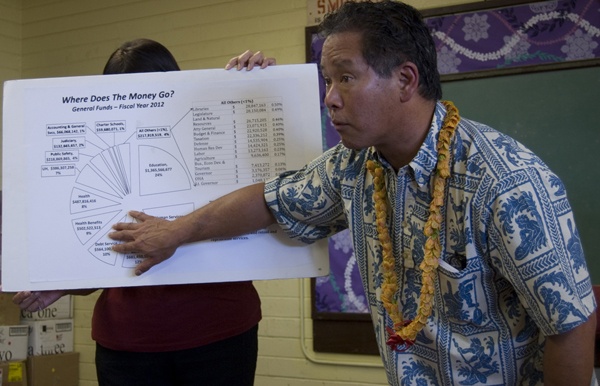KAPA‘A — The Wailua-Kapa‘a Neighborhood Association meeting Saturday at the Kapa‘a Library was not your typical Saturday afternoon, and it wasn’t a typical political meet-and-greet. For a start, Rep. Derek Kawakami, D-14th District, brought with him Rep. Marcus Oshiro, D-46th
KAPA‘A — The Wailua-Kapa‘a Neighborhood Association meeting Saturday at the Kapa‘a Library was not your typical Saturday afternoon, and it wasn’t a typical political meet-and-greet.
For a start, Rep. Derek Kawakami, D-14th District, brought with him Rep. Marcus Oshiro, D-46th District, chair of the House Finance Committee in the 2012 Legislative Session and a candidate for the 2013 Speaker of the House.
Then, rather than give a standard presentation followed by a question-and answer-session, Kawakami said he was going to use a technique he learned at the Symposium for Emerging Leaders hosted by the National Conference of State Legislatures in September: He started by immediately opening the floor to questions.
Immediately, a man in the crowd of almost 60 asked Kawakami about his plans for the Public Land Development Corporation.
“Put some trust in us,” Kawakami said. “Our intentions were well in meaning.”
Kawakami said that he believed the bill would have helped Mahelona Hospital to become more of a long-term care facility, a business which will be needed as Kaua‘i faces increasing numbers of elderly based on census data.
He also is looking at ways to help Hanapepe redevelop and become an economic driver by using state lands.
“We need an inventory of ceded lands,” said one woman.
Kawakami admitted there is a “possibility of repeal” of the PLDC, while Oshiro said it is one of the top three issues facing the Legislature this year.
Oshiro also addressed the possible loss of $250 million to $400 million in federal funding, with the passing of Sen. Dan Inouye.
“That’s similar to losing say, Hawaiian Airlines,” he said. “We need to prepare for this wakeup call. No one is coming to save us.”
According to a graphic shared by Oshiro, the majority of state funding goes toward health and human services, education, higher education, public safety, and education. The rest of the state programs only a receive a small percentage of the state budget.
Members of the community also shared numerous ideas to generate business on the islands.
One woman in the audience asked about legalizing hemp production to offset damage from GMO companies, noting that not only would hemp ruin marijuana by neutralizing crops, but was found to be beneficial in soil reconstruction.
Kawakami said he wants to focus on bringing awareness to the Broadband Advisory Council he serves on. The BAC is looking at ways to provide fiber optic connectivity across the state.
“What holds Hawai‘i back is infrastructure,” he said, adding that the state is struggling to figure out how to get fiber optics “the last mile from poles to homes” and was often finding counties hesitant to work with giving the right-of-way to such work.
Ideally, Kawakami said, he would like the state to provide free access to the absolute best technology means in order to create a strong higher education program and get more people workforce ready, adding that Internet access shouldn’t just be for people who have money.
“It was an audacious goal in 2007 to have free unrestricted Internet access,” Kawakami said. “Five years later, we are still moving toward that goal.”
• Laurie Cicotello, business writer, can be reached at 245-3681 (ext. 257) or business@thegardenisland.com


